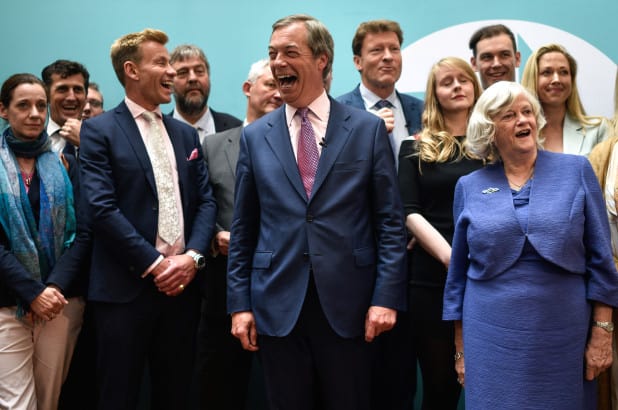
Europe’s centrist parties took a beating in the European Union’s parliamentary elections over the weekend — losing ground to environmental and liberal groups as well as far-right and populist parties.
The upending of the traditional order was particularly noticeable in the UK, where Nigel Farage’s single-issue Brexit Party took a third of the votes — while outgoing British Prime Minister Theresa May’s Conservative Party won just 9 percent, putting it in fifth place.
Farage said Monday the result makes the case that Britain should leave the EU, even if an agreement on that exit isn’t reached.
He added that he doubts the Conservatives will manage to extricate the country from the 28-member body by October’s deadline while they struggle to replace May — and said his party would “stun everybody” in the next British election if it doesn’t happen on time.
“The Conservative Party are bitterly divided and I consider it to be extremely unlikely that they will pick a leader who is able to take us out on the 31st October,” he said.
May, who is stepping down in June after she failed to cement a Brexit deal, called the loss “disappointing” and said it “shows the importance of finding a Brexit deal.”
The four-day election among the EU countries delivered the highest turnout in 20 years, with almost 51 percent of eligible voters casting a ballot.
Traditional center-left and center-right parties failed to keep their majority in the European Parliament’s 751-seat chamber for the first time since the first elections in 1979 — with the Social Democrats and the European People’s Party suffering significant loses.
“This is a profound change,” said Janis A. Emmanouilidis, director of studies at the European Policy Centre, a think tank in Brussels. “The two biggest parties have lost a significant number of seats.”
Although far-right and populist parties made gains, they were smaller than expected.
In Italy, the right-wing League Party headed by Italian Deputy Prime Minister Matteo Salvini won 33.64 percent of the vote.
He said he would try to establish an anti-EU bloc by recruiting other far-right leaders like France’s Marine Le Pen and Hungary’s Viktor Orban.
”Not only is the League the first party in Italy, but also Marine Le Pen is the first party in France, Nigel Farage is the first party in the UK,” Salvini crowed. ”It is the sign of a Europe that is changing.”
But right-wing groups in Austria, the Netherlands and Denmark failed to meet expectations.
Riding concerns about the disastrous effects of climate change, the European Greens made gains in Germany, France and Britain.
The 28 EU national leaders will meet in Brussels on Tuesday to work out the succession of Commission President Jean-Claude Juncker and other key jobs.
